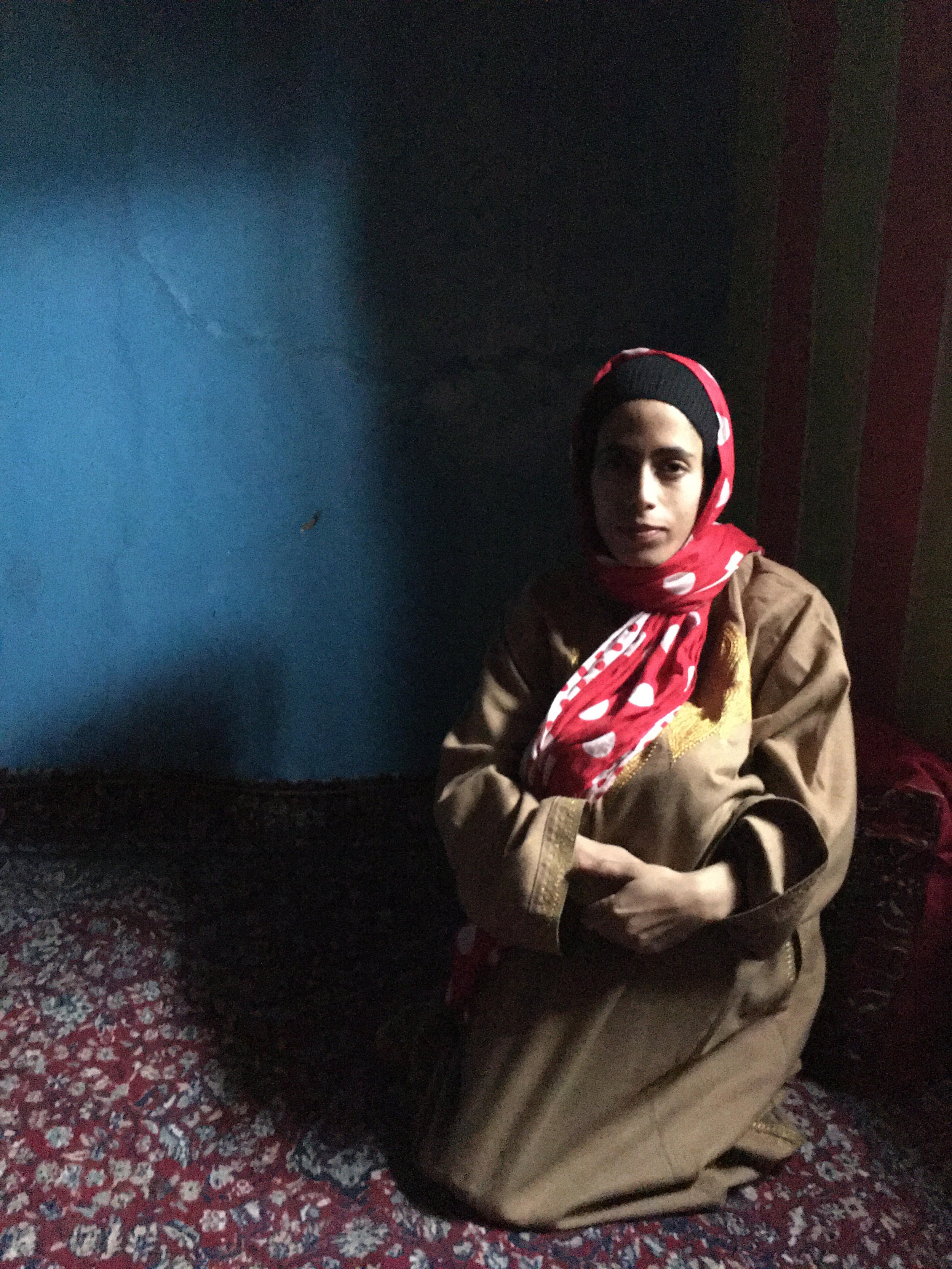I wasn't supposed to meet Nadiya
I wasn’t supposed to meet Nadiya, only her husband Amir Kabir Beigh. He was said to be the first person in the Valley who was blinded in both eyes by the Indian army’s pellet guns. They lived in Baramulla, a northern district that was about an hour’s driving distance from Muzaffarabad, the capital of Pakistan-administered Kashmir. It was here that the struggle had started, in the 1990s. Every Friday, men pelted stones. They chanted, “There is only one solution, gun solution, gun solution.”
The couple lived with Amir’s parents down a quiet street. From their doorstep it was possible to see the snow-covered Himalayan Mountains glistening in the sun. But inside, it was very dark and very cold.
When Amir’s wife slid a tray of tea and snacks through the door, without showing her face, I asked if we might speak. He gave permission. Nadiya was waiting in an attic room, by a shoebox size window. Wide eyes peered out of a white face. Her voice was exactly the sort that I would expect to emerge from such a fragile body. Her hands were busy. At first, I thought she was sewing, but she was nervously tearing a paper into shreds. When she was a child, Nadiya told me, her mother would put her to bed in socks and shoes just in case the soldiers came, demanding to search their house. Before they started rummaging, the soldiers sent them outside, she said, even if it was snowing. Once security forces stripped a female relative. Male relatives became militants. The soldiers tortured the militants and sent them home dead. Amir was her cousin and when they fell in love, they told no one. She read about his blinding in the papers. “My heart completely broke,” she said. She was seventeen.
For years she believed that he would regain his sight. She kept waiting, and then she fell sick, developing heart palpitations, crying constantly, unable to listen even when someone said the same thing, “a thousand times”. The doctors said, “be tension free”, but they never told her how to do that in Kashmir.
Amir can’t find work, but she got a job as a data entry operator in a nearby hospital. They don’t pay her, they can’t afford to, but she goes every day, because if she didn’t, what would she do? Even the protests, where men get to take out their frustration, are closed to her. “My heart longs to go,” she said, wistfully. “But Amir says it’s not the place for a woman.” The district is constantly under curfew. The soldiers cordon off the bridges at night so that no one can get in or out. The shelling triggers her son Anis’ asthma. And since he can’t go to school, she must find all kinds of ways to entertain him. He gets so frustrated sometimes with being cooped up that he smacks her. “What do the soldiers want?” He yells.
Now the sturdy little boy, with his mother’s large eyes, peeks his head through the door. “Mama?” He whispers.
“Wait, my love,” she replies.
“I have a small lion,” he turns to me.
What’s his name?
“Babbar!”
Nadiya draws her son close. “He’s a lion too,” she says, giving him a squeeze. “All I think of twenty-four hours a day is what will happen next? What will happen to him and Amir? And if something happens to me who will look after them?” Anis runs out of the room, and then comes back in again, and after he’s done it a few times Nadiya is over it.
“Go!” she shouts. “Go! Go! Go!”
He finally obeys, and her face relaxes. We smile at each other. “I didn’t want a child,” she says. “Amir’s parents made me. They thought that if I didn’t have at least one that I would leave him. My thinking was, ‘you can deny yourself dreams, but how can you deny your children anything?’”
Is he aware of what happened to his father, I ask? “He’s very aware,” she replied. “I’m scared. Tomorrow he may want to avenge Amir. If I have thoughts in my head, why wouldn’t he? They’ve pushed us to the limit.”
Anis walks in without his clothes.
“Why did you take them off?”
“I’m fed up!”
“He’s spoilt,” Nadiya complains. A friend of Amir’s sweeps into the room and carries away the little boy. Nadiya tucks her knees under her chin and talks about all the things she’d like to do. Some terrible things, such as hurting those who hurt her family. Some ambitious things, like becoming a lawyer. And simple things, like going on holiday.
The Beigs live near Gulmarg, a hill station that turns into an ice palace in the snow. Year after year tourists from outside Kashmir fly into ski and skate. But although Nadiya has relatives living there, she’s never been. Finally, in August she, Amir, and Anis were set to go on their first summer holiday. Then the Indian government shut down the state. “All I have ever know,” she said. “Is trouble.” Her closed fist opened, and all the tiny papers fluttered out.
Sonia Faleiro
